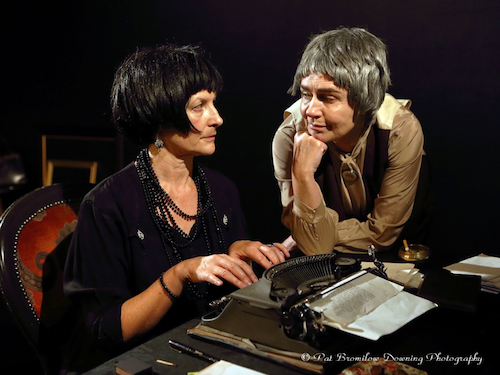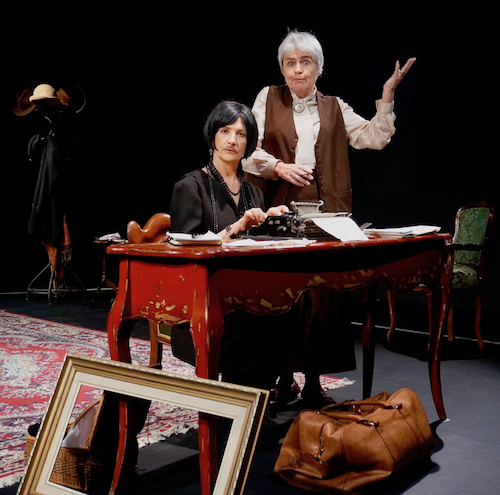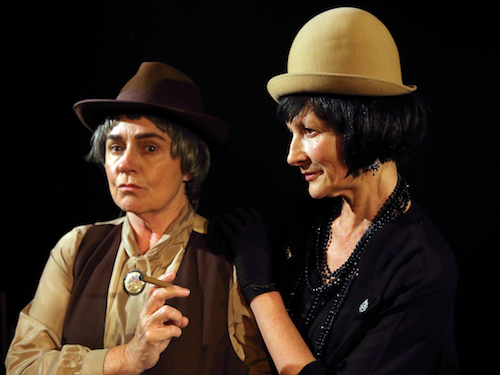 A passion for American literature isn’t a prerequisite for enjoying a play about Gertrude Stein.
A passion for American literature isn’t a prerequisite for enjoying a play about Gertrude Stein.
The author, poet and art collector is arguably better remembered for her influence on the artistic scene in Paris than for her writing anyway, and for her lifelong relationship with her lover, Alice B. Toklas.
Their story is captured in the play Gertrude Stein and a Companion, an affectionate two-hander written by Win Wells.
It’s an independent island of theatre. A pleasurable hour of escapism where you’re drawn into two lives that really don’t affect us any more. There are no deep messages from beyond the grave about how times have changed or cries for tolerance, just a well-researched and engagingly presented look at who they were and how they lived.
These were feisty women who did as they pleased with or without popular approval, both having swapped the restrictive morals of America for hedonistic Paris, where anyone could do anything with anybody with utter insouciance.
 In some ways the playful Gertrude (Shirley Johnston) and dour Alice (Lynita Crofford) seem a mismatch. Gertrude is expansive and welcoming, taking us into her confidence to tell their story with warmth and chatty wit. Alice is the acidic backlash, interjecting sharp jabs and withering opinions to dish up much of the play’s humour in caustic splats.
In some ways the playful Gertrude (Shirley Johnston) and dour Alice (Lynita Crofford) seem a mismatch. Gertrude is expansive and welcoming, taking us into her confidence to tell their story with warmth and chatty wit. Alice is the acidic backlash, interjecting sharp jabs and withering opinions to dish up much of the play’s humour in caustic splats.
The story takes us from 1946, where we begin with the death of Gertrude, then moves backwards and forwards to show us chapters of their lives. In 1946 Alice is devastated by grief, literally hobbled by it as she shuffles around bereft and talking to ghosts. Then we’re back in the 1900s when they met, Alice not much softer even then, but fiercely loyal and as desperate to love and protect her partner as Gertrude is to be loved and protected. The lesbian aspect is very muted, with the emphasis firmly on companionship and mutual understanding.
When Alice moved in with Gertrude her very presence forced Stein’s brother out. That’s understandable, since Crofford brilliantly imbues her character with a spiky aura that would force out anyone she didn’t much take to. And there were many people she didn’t take to among the wits, wags, writers and painters attracted by their bohemian household, like Picasso, Matisse and Ernest Hemmingway. Projections of some of the art and artists being mentioned are screened at the back, as if they were hanging in the living room of their Parisian home.
We see the following years too, when Alice is old and frail but her sharp tongue is still intact, while the ghost of Gertrude weaves the tale around them. The two actors are wonderful, each fully inhabiting their character in words, mannerisms and expressions, all delivered with perfect emotional pitch and timing. There’s an excellent and addictive use of repetition in the poetic text, only in small doses, but enough to reinforce the emphatic nature of these characters.
The programme notes by director Christopher Weare reveal that the script was originally a two hour affair, now cut in half to suit the festival circuit. It will hopefully, he says, touch you and entice you to think again about commitment, loyalty, trust, loneliness, companionship and above all, love. Perhaps, now that it’s being staged as a stand-alone production rather than festival fair, some of the missing scenes could be reinserted. It works well as this compact piece, but there’s certainly room for reexpansion to give us more of their fascinating lives and dig deeper into their relationship with each other and the passing cast of characters.
Gertrude Stein and A Companion runs at Sandton’s Auto & General Theatre on the Square until November 16. Tickets from Computicket. Photos by Philip Kuhn and Pat Bromilow Downing.